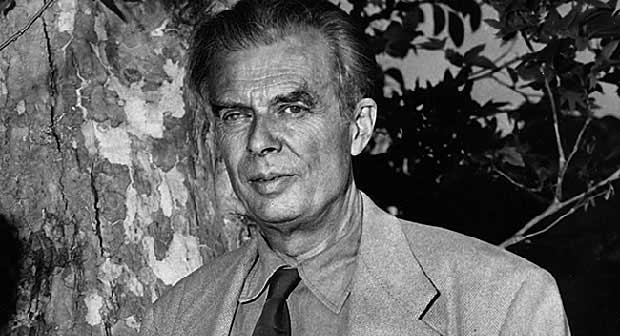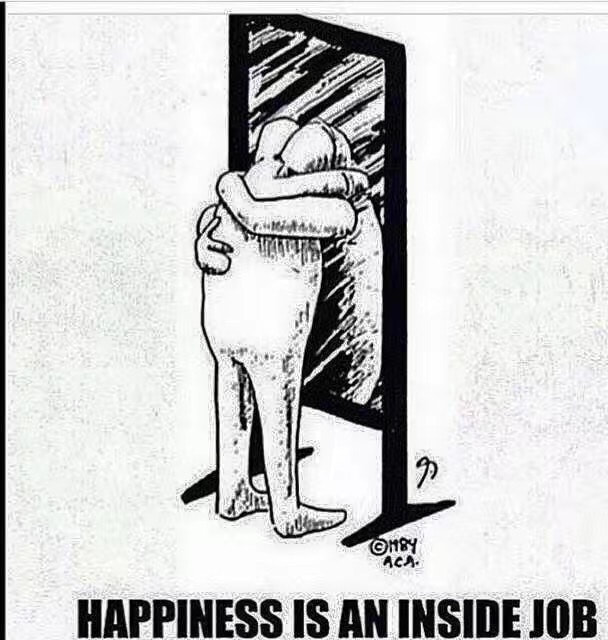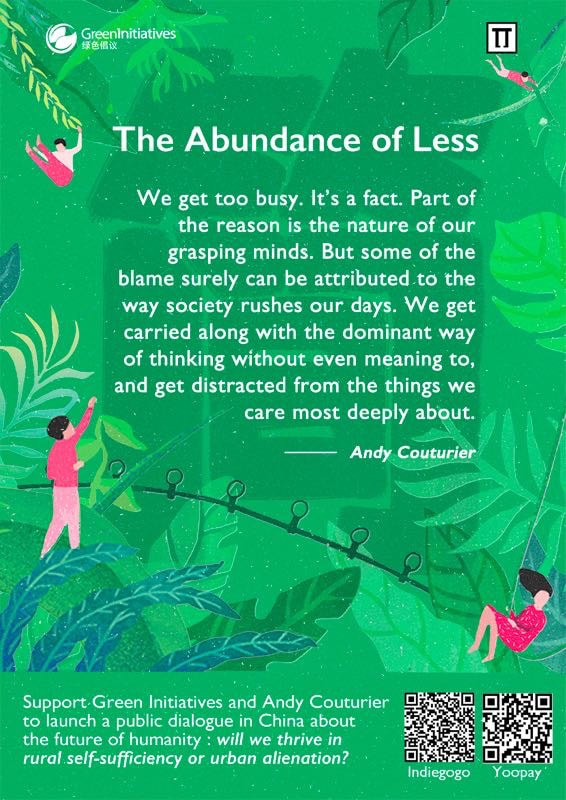|
Illuminated Aldous Huxley wrote the essay The Politics of Ecology a year before his death as if he were leaving a political legacy to the afterworld. More than 10 years before economist Schumacher published Small is Beautiful, and more than 50 years before historian Harari rephrases many of his thoughts in Sapiens - A Brief History of Humankind and Homo Deus - A History of Tomorrow, Huxley boils down the complexities of our species in only a few pages.
Here the most important parts: In politics, the central and fundamental problem is the problem of power. Who is to exercise power? And by what means, by what authority, with what purpose in view, and under what controls? Yes, under what controls? For, as history has made it abundantly clear, to possess power is ipso facto to be tempted to abuse it. In mere self-preservation we must create and maintain institutions that make it difficult for the powerful to be led into those temptations which, succumbed to, transform them into tyrants at home and imperialists abroad. [...] RAPID and accelerating population increase that will nullify the best efforts of underdeveloped societies to better their lot and will keep two-thirds of the human race in a condition of misery in anarchy or of misery under dictatorship, and the intensive preparations for a new kind of war that, if it breaks out, may bring irretrievable ruin to the one-third of the human race now living prosperously in highly industrialized societies - these are the two main threats to democracy now confronting us. Can these threats be eliminated? Or, if not eliminated, at least reduced? My own view is that only by shifting our collective attention from the merely political to the basic biological aspects of the human situation can we hope to mitigate and shorten the time of troubles into which, it would seem, we are now moving. We cannot do without politics; but we can no longer afford to indulge in bad, unrealistic politics. To work for the survival of the species as a whole and for the actualization in the greatest possible number of individual men and women of their potentialities for good will, intelligence, and creativity - this, in the world of today, is good, realistic politics. To cultivate the religion of idolatrous nationalism, to subordinate the interests of the species and its individual members to the interests of a single national state and its ruling minority - in the context of the population explosion, missiles, and atomic warheads, this is bad and thoroughly unrealistic politics. Unfortunately, it is to bad and unrealistic politics that our rulers are now committed. Ecology is the science of the mutual relations of organisms with their environment and with one another. Only when we get it into our collective head that the basic problem confronting twentieth-century man is an ecological problem will our politics improve and become realistic. How does the human race propose to survive and, if possible, improve the lot and the intrinsic quality of its individual members? Do we propose to live on this planet in symbiotic harmony with our environment? Or, preferring to be wantonly stupid, shall we choose to live like murderous and suicidal parasites that kill their host and so destroy themselves? Committing that sin of overweening bumptiousness, which the Greeks called hubris, we behave as though we were not members of earth's ecological community, as though we were privileged and, in some sort, supernatural beings and could throw our weight around like gods. But in fact we are, among other things, animals - emergent parts of the natural order. If our politicians were realists, they would think rather less about missiles and the problem of landing a couple of astronauts on the moon, rather more about hunger and moral squalor and the problem of enabling three billion men, women, and children, who will soon be six billions, to lead a tolerably human existence without, in the process, ruining and befouling their planetary environment. Animals have no souls; therefore, according to the most authoritative Christian theologians, they may become treated as though they were things. The truth, as we are now beginning to realize, is that even things ought no to be treated as mere things. They should be treated as though they were parts of a vast living organism. "Do as you would be done by." The Golden Rule applies to are dealings with nature no less than to our dealings with our fellow-men. If we hope to be well treated by nature we must stop talking about "mere things" and start treating our planet with intelligence and consideration. [...] For politics, nationalism, and dogmatic ideologies are luxuries that the human race can no longer afford. Nor, as a species, can we afford the luxury of ignore man's ecological situation. By shifting our attention from the now completely irrelevant and anachronistic politic of nationalism and military power to the problems of the human species and the still inchoate politics of human ecology we shall be killing two birds with one stone -reducing the threat of sudden destruction by scientific war and at the same time reducing the threat of more gradual biological disaster. [...] In a world where political problems are thought of and worked upon within a frame of reference whose coordinates are nationalism and military power, these ecology-oriented organizations are regarded as peripheral. If the problems of humanity could be thought about and acted upon within a frame of reference that has survival for the species, the well-being of individuals, and the actualization of man's desirable potentialities as its coordinates, these peripheral organizations would become central. The subordinate politics of survival, happiness, and personal fulfillment would take the place now occupied by the politics of power, ideology, nationalistic idolatry, and unrelieved misery. Pretty much two years ago, it was late November 2015, I sat with Alex on the restaurant terrace of Villa Gris in Pranburi, Thailand, and expounded for the first time my grand theory of civilization and its discontent. I told him after a two-hour elaboration – he must have suffered hellishly - that I would wish for a sabbatical to put my thoughts on paper. Half a year later my employer lets me go with a financial cushion good for two years of moderate living and in the same week the dean of the institute of sinology at the university of Vienna asks me if I would like to start a PhD there. I did not and still don’t understand what exactly happened then, something like transcendental meditation bursting its way into reality, the power of the controlled subconscious taking hold of my life or simply serendipitous coincidences. There is though this feeling that I have embarked on a project which combines something very personal about my life, a narrative which can only be told by me, to a problem which humanity at large suffers from. It is under such rare circumstances, when one can – in the words of neurologist Viktor Frankl - subject his life to a cause greater than oneself to find meaning. I felt that I had a calling which I needed to follow. My research subject is very much related to the above cartoon: Happiness is an Inside Job. We are brainwashed with self-help, self-management, self-esteem and so much more self-design, which tells us a story about us being in control of our little lives and the way we feel about them. My grand theory, which I told Alex first time two years ago, could thus be summarized as Happiness is an Outside Job. It is not so much us who manage life satisfaction and well-being, but a series of factors which are beyond our influence or if under our potential influence then the control knobs are seriously difficult to find and handle.
Now, before you start to shoot: I am aware that the truth is like always somewhere in between; but, and this but is very important, we live in societies which make it increasingly difficult to exert self-control over our lives. A flood of information inundates our minds, technological inventions and standards streamline how our bodies move; it is as if one truly must sever the ties with modern society in order to break free from negative outside influences. While I collected data which shows that we experience in almost all industrialized societies an increase in drug and medication abuse, a rise in burn out and ADHD diagnosis, and above all an epidemic of suicides and suicide attempts, I found in spring 2016 a beautiful book, which showed a solution to all this and which I read as a preparation for our first journey to Japan. Its author, Andy Couturier, did not waste time trying to confirm my above assumptions through academic analysis. He seemed to agree with Jiddu Krishnamurti, that its no measure of health to be adjusted to a profoundly sick society, and set out to profile like an applied social psychologist ten people who have built well balanced lives and radiate profound satisfaction. He talked to them about their values, about their lessons learned, about the things which make a good life. The result is The Abundance of Less, a beautiful piece of writing, a stunning catalogue of sustainable living, a guidebook on how to regulate our interaction with society at large, a manual for an efficient economy of the self and of how to adjust one’s behavior to a world which offers many choices but pressures us unconsciously into enslavement. I calculated that at most three people would read my PhD thesis, me and two supervisors, before it would – if printed - be dumped in the university archive. It felt as if four years of my life and the demanded analytic rigor was a too high price to pay for no result but me obtaining a degree. The support of an existing and well written book seemed to heed the probability of creating more impact with less effort. So, I sent probably a year ago an email to Andy and asked him if he would like to come to China on a book reading tour which I would organize for him with Green Initiatives, a nonprofit which I had started to advise on strategic matters. Well, you guess, Andy agreed and I am pretty thrilled to present to you The Abundance of Less – Goes to China! If you have stayed with me until here, please do scan the QR code on the flyer and obtain more information on the project there. But most importantly, support this crowd funded project with a small donation. Believe me, you do something important. And, if you have a few minutes left, then forward this and the flyer to your three best friends. |
Archives
May 2023
Categories
All
|



